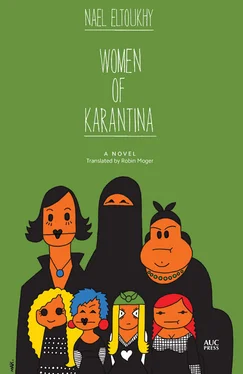As numerous historians have observed, the Alexandrians have not won a single decisive victory in all these battles. A victory on the ground, we mean. All their victories have been spin or symbolism: dramatic, stirring scenes rather than actual victories. We are borrowing here from the Alexandrian cartoonist Hassan al-Basha who, in the local newspaper Sea and Seagull, depicted a meeting of an Alexandrian cell headed by an armed man, gazing at a blackboard marked “Chronicle of the Victories of the Sea” (by which is meant: Alexandrian victories) and saying in disgust: It’s just one “stirring scene” after another. Aren’t there any proper victories?
Some two decades earlier, in the mid-eighties, the city of Alexandria saw the opposition strike a blow that was, back then, quite unprecedented anywhere in Egypt. It was in a number of summer theaters — where troupes would put on plays starring comedians of the first rank, like Sayyid Zayyan, Mohamed Nigm, Waheed Saif, and a very young Mohamed al-Heneidi — that the seeds of Alexandria’s first political protest against its oppressors in the modern era took root. Audiences took to whistling at and applauding any scene that bore a trace, however faint, of political subversion. And if we bear in mind that these were family theaters first and foremost — since throughout the eighties and nineties Egyptian families would spend the summer months in Alexandria — then we can add to this the fact that they raised a generation of children who received their first political lessons there and later, as tumultuous youths, would put them into practice.
In the first days of the 2011 revolution, one of the original “instigators” was arrested, a man called Hani Samir. He was brutally tortured, and after his release was invited onto a famous TV talk show, on which he said, word for word: It was my dad who taught me politics. Not politics exactly, but he taught me to love Egypt and to understand that if something happened to my friend it might happen to me later. When I’d see him and his friends at The Green Soldier (a famous play starring Sayyid Zayyan), shouting and clapping and whistling, it would make me shout and whistle too.
In those days, Alexandria was the brightest chapter in the chronicle of Egyptian resistance. All of Egypt’s other provinces were keeping their heads down. No one knows precisely why. A short while ago we referred to the Alexandrian mentality, always alive to a former glory that had slipped through its fingers when the July regime took over back in 1952, but there are other factors too.
From the moment the city was founded — well, a century after it was founded, to be precise — the unmistakable traits of the Alexandrian had started to take shape. Rage, for instance, is a seminal trait, the rage which is sometimes referred to as “ill temper” in Egyptian dialect. Your Alexandrian’s a nice enough fellow most of the time, no one disagrees with that, with the exception of those instances where he senses some outside threat, particularly — if we’re aiming for precision — a threat directed at his Alexandrian identity. Small wonder, given that Alexandria is the only Egyptian city to have evolved a clear communal identity of its own and to have developed rites for the veneration of this identity — and rites for rage, should this identity be harmed. Alexandrians learned this from their former European neighbors, so proud of their consulates and foreign privileges, but they also take it from their current neighbors, the Bedouin, the desert Arabs of Matrouh. The revolutionary Bedouin of Matrouh was — and remain — the neighbor with whom the authentic Alexandrian feels most at home, not the slack-jawed Delta peasant foisted on him by geography.
The year before “The Year of Khaled Said,” a blogger wrote a post on Alexandria, a satire, more or less, whose Alexandrian protagonists were given mocking nicknames. Thousands of Alexandrians were up in arms, on blogs and Facebook. The blogger’s Facebook account (we’ve no desire to mention his name) was shut down for one year and its reactivation — which further enraged the Alexandrians — coincided with the flare-up of the Khaled Said affair. This might unravel for us the reason behind the unbridled anger with which news of Khaled’s murder was received. It was not directed at his killers alone, nor at the police, but at anyone who took it upon himself to mock the city, let alone spill Alexandrian blood. One famous image from the protests was of a young woman, lip bleeding after being assaulted by policeman, and carrying a sign on which was written “Alexandrian blood does not come cheap.”
For all these reasons, and in the midst of all the fighting and fire, the blood that flowed for freedom’s sake, Ali and Inji surfaced in the City of the Sea. In other words, just as Alexandria’s yearning for a savior burned brightest.
A new phase of Ali and Inji’s life began with the birth of Hamada.
A fat boy, four kilos. Eyes wide like his father’s and green like those of his grandmother, Inji’s mother. He laughed a lot and cried little, looking about him in astonishment. The infant was passed from hand to hand. He seemed like a divine compensation for the injustice suffered by his parents, exiled, dispossessed, forlorn.
The infant brought Ali to his senses. For a while, he stopped sleeping with Umm Amira. He turned into a proper father. He grew a big mustache and started speaking slowly. His sources of income proliferated: the shop, the little scams practiced on his customers, and the passing of some of these customers — the ones after sex and hashish — on to Abu Amira’s house and so getting paid twice over. Ali knew how to talk to the customers. He trailed Adel to Ramleh Station, to Saad Zaghloul Street and the street named after Saad’s wife, Safiya, and slowly but surely he accustomed himself to sitting at the bars downtown. He didn’t drink much. He watched the drinkers. Talked to them. Led them by the hand to Camp Cesar. Handed them to Abu Amira. Abu Amira would narrow his eyes at him. Sometimes he’d smile and sometimes he wouldn’t. So what? People smile at times and at other times they don’t. But Ali was yet to learn this and was unsure how to interpret these smiles, just as he was unsure about the meaning of anything to do with Abu Amira. And so he went on. He walked his path and never looked back.
But there’s more. Back then, everyone would smile at Ali. People who knew him and people who didn’t: taxi drivers, shopkeepers, café waiters, even the junkies and johns. He sensed something circling him, drawing closer, but he couldn’t touch it. Forever about to attack. Inji felt something similar. Minna would bring her students so she might teach them too, and in these students’ looks there’d be a spark, a passion, a longing, but for whom she couldn’t say. If we might be permitted to interject, we would have to say those looks were looks of adoration — for her. Unquestionably.
Inji fought the feeling. She put up considerable resistance, a violent resistance, because it filled the air around her, it hemmed her in wherever she went, even though she had no proof that it was there. At the end of the day, there isn’t one of us capable of believing that everyone adores them and, moreover, that he can discern this purely from their looks. Like he’s a hero. Like he’s Raafat al-Haggan. It was two months after giving birth before Inji got her hands on tangible evidence for her suspicions. Hamada was in her arms and one of her students was telling her about an emotional tangle she was going through — the boy had spoken to her several times of his desire that they should split up — and the girl was crying, so Inji put Hamada on the couch and took the girl in her arms. And as her tears reached their peak the girl cried out, Oh miss! If only I could be like you! The miss said nothing, then, after a bit, hesitantly asked, Why do you say that, Shaimaa? The girl pulled her face back and wiped her nose with a shirtsleeve. She stared at the floor for a moment. Because you’re strong. If there’s a guy you don’t like you kill him.
Читать дальше












